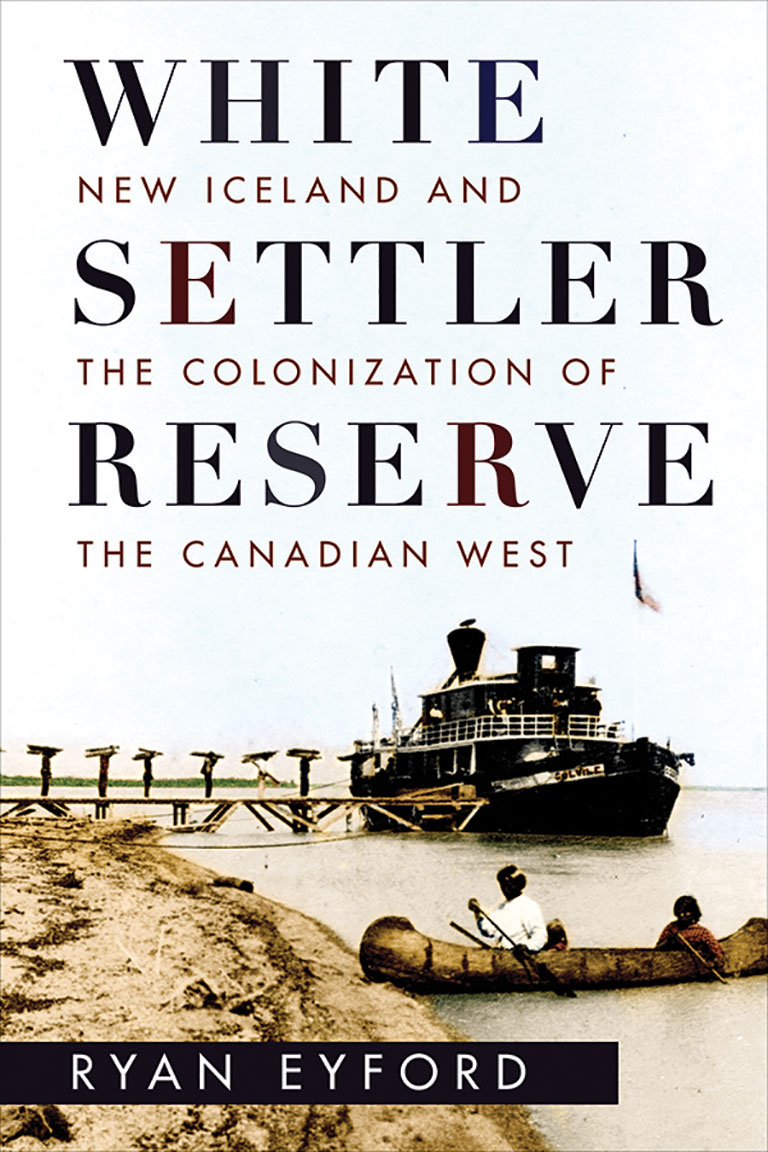White Settler Reserve

White Settler Reserve: New Iceland and the Colonization of the Canadian West
by Ryan Eyford
UBC Press
271 pages, $32.95
In a mad rush to settle the “untamed” West following the Hudson’s Bay Company’s surrender of Rupert’s Land and the creation of Manitoba, the federal government began a systematic, albeit at times misguided, attempt to populate this newly acquired territory with “desirables.” At the same time the government shunted Indigenous peoples, both First Nations and those of mixed race, onto reserve lands following the signing of the numbered treaties and the passing of the Manitoba Act.
At the end of the nineteenth century, the reserving of land was not limited to our contemporary understanding; besides being a destination for Indigenous peoples, reserves were also a means of setting aside large swaths of land for desired immigrants. In White Settler Reserve, University of Winnipeg history professor Ryan Eyford offers a complex argument regarding Canada’s intentions in terms of colonization and how the immigrant reserve system was critical to creating the sense of a liberal nation-state project in the West. Additionally, Eyford performs a number of conceptual analyses designed to lead readers to think historically about notions of liberalism, race, settlement, and colonization.
By 1875, the federal government was fully committed to attracting people it thought of as appropriate settlers to the region that is now Alberta, Saskatchewan, and Manitoba. And it acted on the idea that keeping immigrants and Indigenous peoples separated via reserves would keep relative peace following the then-recent turmoil in Red River and ongoing unrest further west. Eyford carefully constructs a history of this reserve system, specifically by delving into the shared experience of the Icelandic reserve on the western shore of Lake Winnipeg. He explains Canada’s attraction to Icelandic settlers and the situation that sparked a mass emigration on the part of these northern mariners.
The Icelanders who ventured to New Iceland suffered terribly at first due to disease, poverty, and — according to the Canadian government — a lack of fortitude and the attributes needed to settle this part of the world. The federal government had initially targeted Icelanders based on the assumption that, as northerners who were white, they would be easily adaptable to life in the Canadian West. Nothing, presumably, could have been further from the truth. Faced with what might have been a complete disaster, the government of the day eventually felt some responsibility in providing basic care for these poor immigrants.
Most high-ranking Canadian officials of the time regarded liberalism as part of their approach to settling the Northwest, and they targeted newcomers who, Eyford writes, “could contribute the maximum amount of productive and reproductive labour while at the same time being amenable to the assumptions about gender, race, class, and religion that policy makers took for granted as the hallmarks of modern, progressive civilization.” Liberalism worked, if you were part of the club.
Two reserve systems co-existed in the West with the same goal in mind — imperial progress. The immigrant reserve system allocated land to those who were deemed desirable, and the Indian reserve system was essentially a land grab in the name of progress. Eyford’s history speaks to those who fell through the cracks and to the improbable success of New Iceland. Critical companions to his work would include James Daschuk’s Clearing the Plains and Joseph Boyden’s Louis Riel and Gabriel Dumont, which help to paint a picture of the dynamics in the late nineteenthcentury North-West Territories.
Despite the depth and complexity of his argument, Eyford gracefully articulates the nuances of the region at the end of the nineteenth century and provides an opportunity for reflection both by those of us who currently occupy this territory and by those who have had their land occupied. As such, White Settler Reserve is an essential wedge in the conversation related to reconciliation, immigration, and the connection between land and identity
Themes associated with this article
Advertisement




